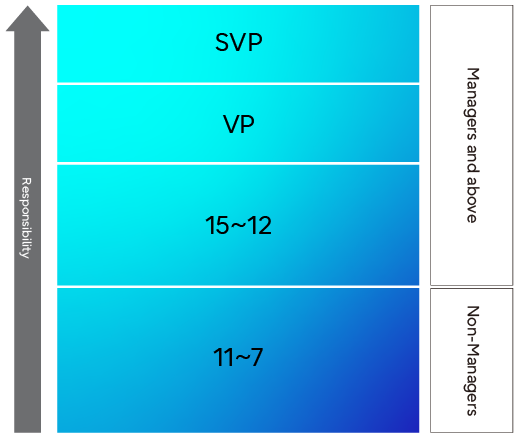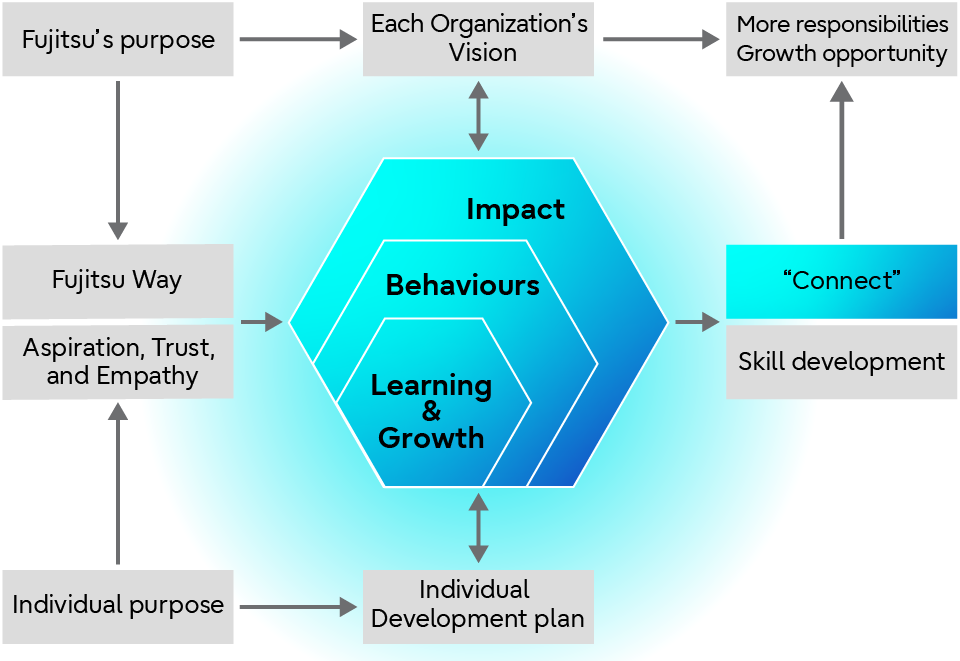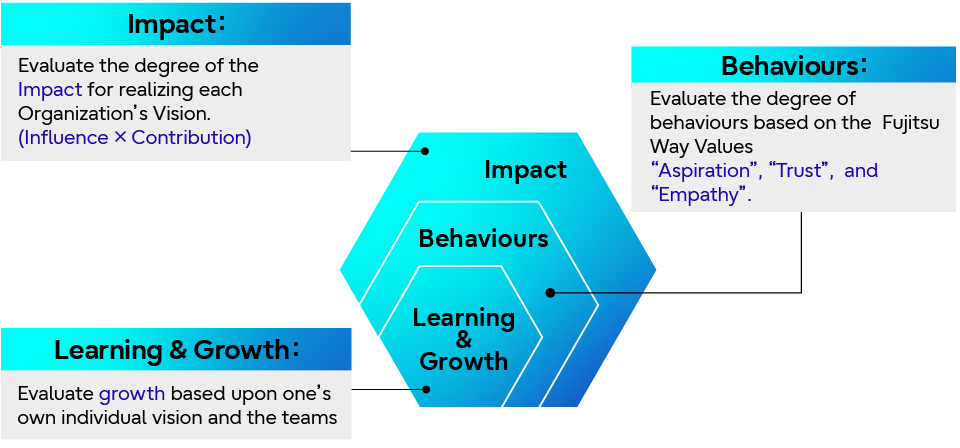Financial Well-being
Performance Evaluation and Compensation
Personnel Handling based on Position-based HR Management
To achieve our purpose, the Fujitsu Group aims to be an organization that fosters innovation throughout society. We strive to quickly and agilely assemble our talented individuals from across the Group, united by a shared goal: to solve the challenges faced by our customers and society at large.
To foster "career ownership," where employees take on challenges and grow with their own motivation, and to achieve an organizational design and personnel placement system that aligns the right talent with the right positions based on our vision and strategy, the Fujitsu Group promotes Position-based HR Management as a global human resource platform. This initiative supports the growth and actions of each employee.
Within the HR System based on Position-based HR Management, we have established the “FUJITSU Levels”. This framework clearly defines the duties and staffing requirements of each job, classifying them based on their occupation and responsibility levels.
The FUJITSU Level framework determines the corresponding levels of remuneration. Bonuses are awarded based on evaluations for FUJITSU Level 15 positions and below.
For executive positions of FUJITSU Level VP and above, we are implementing an STI(*1)/LTI(*2) scheme that is more closely aligned with performance outcomes. This scheme will also apply to executives both in Japan and overseas.
Remuneration levels are set with the goal of attracting and retaining a diverse and talented workforce. These levels will be reviewed as needed to ensure competitiveness against global corporate benchmarks. For example, in April 2023, we increased the average monthly salary by approximately 10%. Future remuneration levels will be adjusted appropriately based on market fluctuations.
We are also focused on implementing a flexible yet attractive compensation system, where for some occupations and key areas of the business, we have introduced sales incentives and a compensation system for high-level specialist positions.

*1: Short Term Incentive: Remuneration set based on the level of achievement of one-year performance targets, etc.
*2: Long Term Incentive: Remuneration set based on the level of achievement of medium-to-long-term performance targets, etc.
Evaluation System for Driving Employees’ Independent Challenge and Growth
Fujitsu’s “Connect” global common evaluation system aims to align Fujitsu’s purpose with the individual aspirations of each employee. This alignment fosters individual growth and maximizes the impact on the organization, customers and society.
Connect features three key elements. The second element, in particular, involves regular one-on-one meetings and quarterly Connect Conversations between team members and managers. These meetings focus on providing feedback on individual performance reviews and future growth. In the last quarter of FY2024, around 85% of employees had a Connect Conversation.
(1) Creating focus area
“Focus area” represents the strategic policies and goals for each business period, aligning with Fujitsu’s Medium-term Management Plan and organizational vision.
Team’s focus areas are established based on the team’s goals, and shared with all team members to maximize team performance.
Each individual’s focus areas are created as challenging goals, mutually agreed upon in the Connect Conversation between a team member and a manager.
(2) Frequent one-on-one meetings and quarterly Connect Conversations
At least once per month, meetings are held one-on-one between team members and managers, with individual selection of the required topics, including review of recent performance and other matters that may not be discussed on a daily work basis. In addition, every quarter, another one-on-one meeting called Connect Conversations are held to discuss individual performance and future growth and career development from a mid-to-long term perspective.
Fujitsu highly values the realization of “Aspiration”, “Trust” and “Empathy” as the key values of the Fujitsu Way, which underpins Fujitsu’s medium- and long-term value structure. Accordingly, within the “Connect” system, employees are assessed on their “Impact”, “Behaviours” and “Learning & Growth” relative to achieving each organizational vision and Fujitsu’s purpose. (See figure at right.) Further, feedback on an individual’s performance may be gathered from project leaders and related departments to understand a range of factors and assist final evaluation decisions. This allows a manager to gain a multifaceted understanding of workplace relationship factors such as leadership and ability to collaborate, aspects that may be difficult to reflect in a manager-only evaluation. These form comprehensive feedback to the individual employee on their performance and strengths, plus areas for improvement. Managers are subject to an engagement survey in which their team members indicate their trust in the manager. Additionally, “people discussions” are conducted within each organizational unit to discuss measures aimed at the future growth of each employee and to validate the evaluations.
(3) Using evaluations for remuneration and career development supports
Using the evaluation results in considerations of remuneration and career development supportsrt enables us to create mechanisms that ensure consistent personnel management and maximize the growth both of individuals and the organization. This, in turn, can have a significant impact on the organization, customers and society at large.


Employee Benefits Program
The Fujitsu Group has programs in place that are suited to the lifestyles of employees and their families and are designed to enable them to achieve a sense of well-being.
As part of the trend toward more diverse and flexible ways of working, and to allow employees to make their own choices, Fujitsu introduced the ”F Life+” cafeteria plan(*3). In line with the belief that active work, challenges and personal growth for every employee will lead to growth and development for the company, we have established various incentives to provide medium- to long-term motivation. These include a defined contribution pension plan, an employee shareholding association, a property accumulation savings plan, and group insurance benefits. Additional programs implemented by Fujitsu provide support in the areas of housing, medical care, healthcare, and childcare and nursing.
*3: Cafeteria plan:
A system under which employees select the employee benefits they want or need from a diverse menu prepared by the company, taking advantage of the chosen options by using "employee benefits points" awarded by the company.
Shareholding Plan
The Fujitsu Employee Shareholding Association enables employees to purchase Fujitsu shares through contributions of greater than 1000 yen deducted from salary or bonuses. Subscription is voluntary, but, as an encouragement, Fujitsu provides between 3% and 10% of the monthly contribution value, according to length of subscription period. Through this system, employees can build long-term assets. Also, an individual employee who holds Fujitsu shares will have a heightened sense of participation and responsibility for corporate growth, ensuring alignment of employees and management with the goal of increasing corporate value.
Key Initiatives in Regions
GRiP Financial Well-being Workshop Series in Global Delivery Business Group
Fujitsu’s Global Delivery Business Group held the GRiP Financial Well-being Workshop Series to support the financial independence of each and every employee in building a safe and secure financial base. 800 employees have participated in workshops on topics such as budgeting, saving, investment, debt management and overcoming financial insecurity, receiving practical advice from finance experts to assist in smarter financial planning and decision-making. Participating employees said that they enjoyed the lively Q&A sessions and sharing of experiences; they not only learned how to create sound financial habits, but also how to reduce money stress and be more proactive in managing their own finances.



